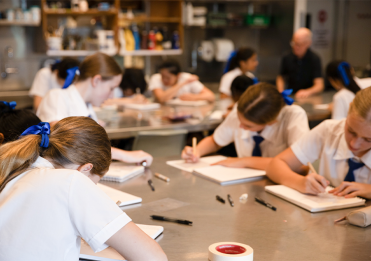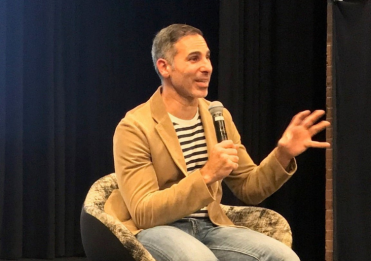Why do you write your own songs?
Writing music is a way for me to express my ideas. I usually compose music that has a connection to what I am thinking at that time. Also, I simply just love making music. I love that there is meaning behind each word and musical choice, as well as keeping it aurally interesting.
Music does not just write itself. How do you approach the creation of a new song?
I find my inspiration through other artists’ music, movies, books, and advertisements—basically everything. Sometimes, when walking from class to class, a melodic idea pops into my head, and I record it on my phone. Then, when it comes to writing music, I already have a bank of melodies to draw on, and I add chord progressions beneath them. After that, I can just ‘hear’ what instruments, melodies and harmonies should be added.
It takes a lot of time to develop skills as a composer, what skills would you say are most influential in your song writing?
The skill of appreciating other artists’ work is most important for me. I found my favourite artists when I was about 12 years old, and since then, I have been listening to their music. At first, I was drawn to their work because of its text, but then I started listening more closely. I started to uncover more and more in songs that I listened to. I listened to artists’ demos, hidden vocals, use of instruments and started to realise just how much there is to composing.
Do you prefer working on a particular instrument when you compose?
First, I figure out the melodies and then a rough chord progression. I do this with a piano, or some sort of a keyboard connected to my computer. However, the most important instruments for me are MIDI instruments (virtual instruments, played by a keyboard). They have a unique timbre and are suitable for a range of different genres. Timbre, or the sound an instrument makes, plays an important role in my songs when it comes to establishing the mood. So, I would say that MIDI in combination with the keyboard is the most important tool I use when composing.
What inspired you to write ‘Okay’?
The song explores the idea of identity crisis and how it is okay to feel a certain way. As a student in Year 11, making decisions about your future can at times be difficult or confusing. I realised it’s okay to feel this way, and instead of ignoring these feelings, I decided to embrace them and express how I felt through my music. When I was working on the song ‘Okay’, I had completely forgotten that I was for doing an assessment task because I enjoy creating music so much!
Is there an artist or group that has had a major impact on you as a songwriter?
BTS have had a big influence on me as a songwriter. I have learned how to write, produce, mix and record songs by studying their approach to composing. As artists, BTS do not just reproduce others’ works, but actually craft their own songs, making it more special and sincere and this is one of the many things I have learned from them: be sincere and express what you truly believe.
What is most important to you about music?
I think it all comes down to how you feel about music. If music is just a subject that it is easy to get high marks in, I do not think that alone is meaningful. I create music because I am passionate about it and I am willing to try anything to express myself. When I write songs that I like, I feel a sense of accomplishment and I am motivated to write more. This satisfaction itself is what drives me to pursue new musical challenges. Again, it all comes down to what you think about music, be sincere!




